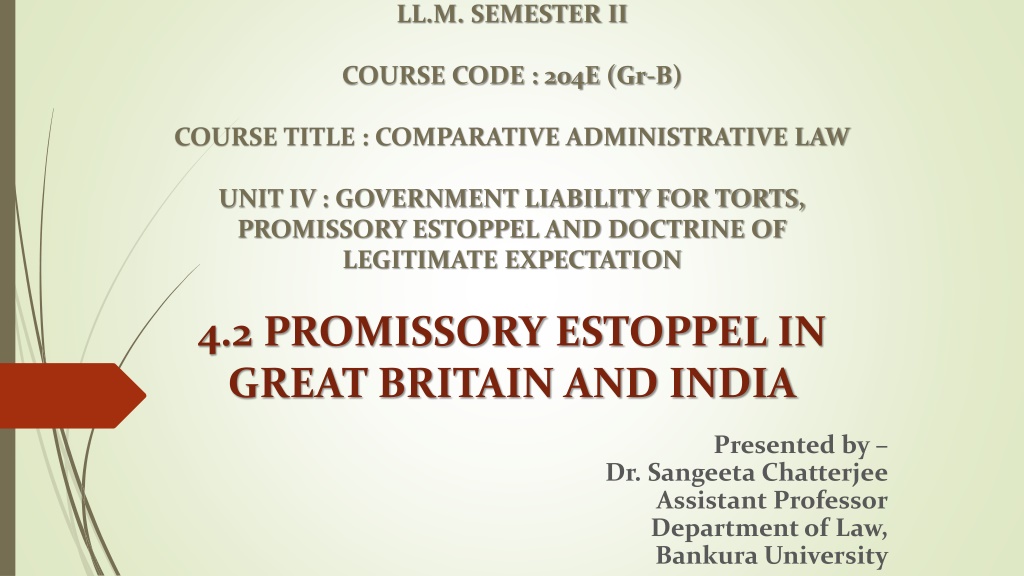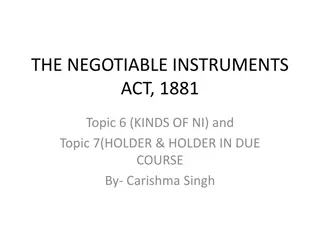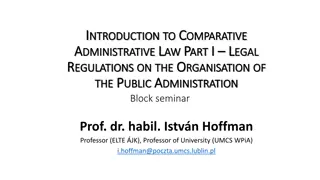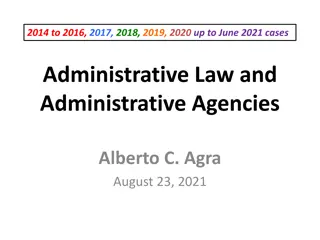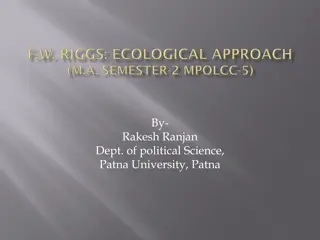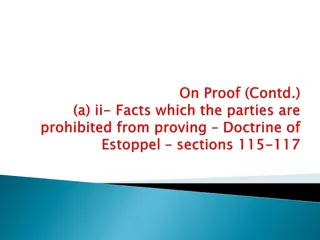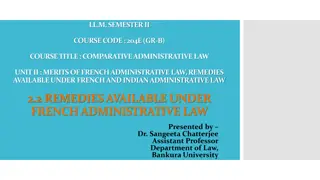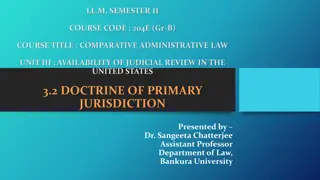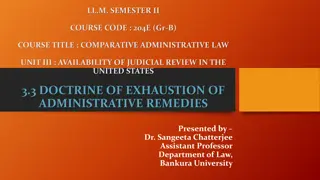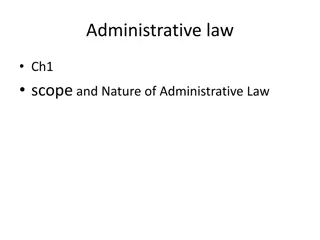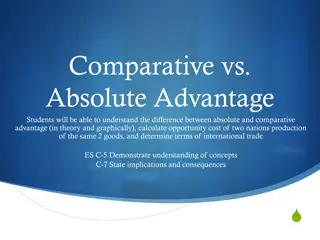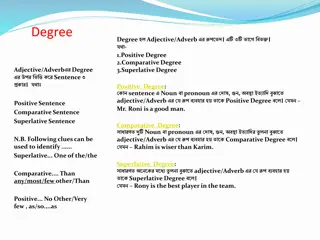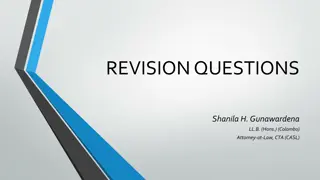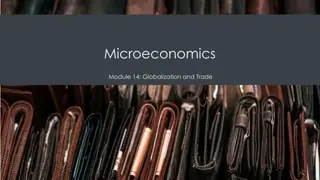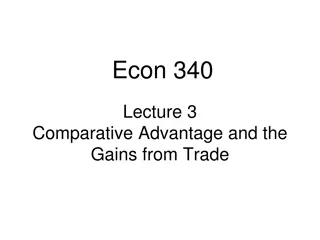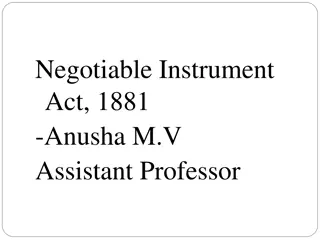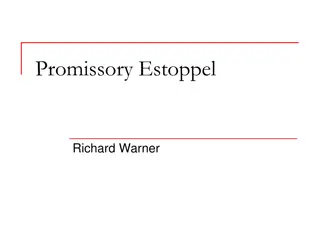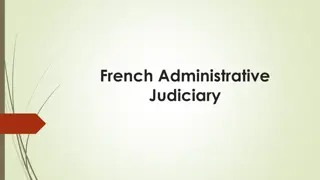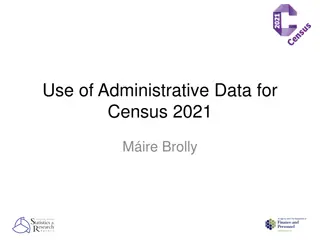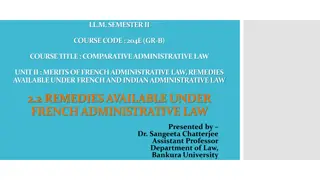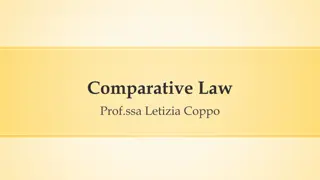Understanding Promissory Estoppel in Comparative Administrative Law
Estoppel and specifically Promissory Estoppel have evolved as important legal doctrines to prevent injustice and ensure that promises made are upheld. This concept is explored in the context of administrative law, particularly looking at government liability for torts, the doctrine of legitimate expectation, and the application of Promissory Estoppel in Great Britain and India. The doctrine's significance, evolution, and application, particularly in cases involving government and public authorities, are discussed, shedding light on its role in ensuring fairness and justice in legal relationships.
Download Presentation

Please find below an Image/Link to download the presentation.
The content on the website is provided AS IS for your information and personal use only. It may not be sold, licensed, or shared on other websites without obtaining consent from the author. Download presentation by click this link. If you encounter any issues during the download, it is possible that the publisher has removed the file from their server.
E N D
Presentation Transcript
LL.M. SEMESTER II COURSE CODE : 204E (Gr-B) COURSE TITLE : COMPARATIVE ADMINISTRATIVE LAW UNIT IV : GOVERNMENT LIABILITY FOR TORTS, PROMISSORY ESTOPPEL AND DOCTRINE OF LEGITIMATE EXPECTATION 4.2 PROMISSORY ESTOPPEL IN GREAT BRITAIN AND INDIA Presented by Dr. Sangeeta Chatterjee Assistant Professor Department of Law, Bankura University
INTRODUCTION Estoppel as a procedural remedy, according to the ancestral vocation of English law was born as an equitable defense exception to prevent the enforcement of the customary rules in cases where their application would have produced unjust results. The doctrine of Promissory Estoppel is premised on the conduct of the party making a presentation to the other. It enables that party to arrange his affairs in such a manner as if he said representation would be acted upon. Thecore of the doctrine is faith of the people in governance. It has assumed tremendous importance in this era of global economy.
BACKDROP Promissory estoppel took shape in the nineteenth century to smooth out the rigidityof the doctrine of consideration. Recently, the original concept has becomediluted. Paradoxically, promissory estoppel has been undergoing an identity crisis at thevery moment it seems to have found final approval. This doctrine subordinates the binding nature of the promise to the existenceof a counter-performance orof a mutual promise. The reason behind placing this additional requirement for a contract to be legally recognized has been the subjectof endless debates. On the one hand, consideration is said to be based on the need of the parties to have a meeting of minds or a single perception of the contract. On the other hand, it is rooted in an attitude of utmost caution with regard to free promises, becauseof theirone-sidedness.
DOCTRINE OF PROMISSORY ESTOPPEL Estoppel is a rule whereby a party is precluded from denying the existence of some state of facts which he had previously asserted and on which the other party has relied or is entitled to relyon. The doctrine of Promissory Estoppel has been evolved by courts on the principleof equity to avoid injustice. A person who himself misled the authority by making a false statement, cannot invoke this principle, if his representation misled the authority into taking a decision which on discovery of misrepresentation is sought to be cancelled. The doctrine of Promissory Estoppel applies also to government and public authorities, however, it is used only at the demands of the law of equity.
THE CONCEPT Estoppel in Black s Law Dictionary is indicated to mean that a party is prevented by his own acts from claiming a right to the detriment of the other party, who was entitled to relyon such conduct and has acted accordingly. In otherwords, the principleof promissory estoppel is that 1. where one party has by his words or conduct made to the other a clear and unequivocal promiseor representation, 2. which is intended to create legal solutions or affect a legal relationship to arise in the future, 3. knowing or intending that it would be acted upon by the other party to whom the promise or representation is made, and 4. if in fact so acted upon by the other party, the promise or representation would be binding on the party making it and he would not be entitled to go back upon it, 5. if it would be inequitable to allow him to do so, having regard to the dealings which have taken place between the parties.
POSITION IN GREAT BRITAIN In 1854 the House of Lords, ruling on the case Jorden v. Money, held that the doctrine of estoppel does not apply to a case where the representation is not a representation of a fact, but a statement of something which the party intendsordoes not intend todo. It took nearly a century for the principle to undergo an important transformation by virtue of the statement by Lord Denning in the case of Central London Property Trust Ltd v. High Trees House Ltd, 1956. Despite the fact that the jurisprudence was largely in favour of the need of the existence of a contractual relationship between the parties, the position of Lord Denning would seem to open the gates to the possibility that estoppel be imbued with an offensive soul, which, as will be seen, can be traced to U.S. jurisprudence.
ESSENTIAL ELEMENTS OF THE ENGLISH RULE OF PROMISSORY ESTOPPEL 1) The presence of a promise or a statement put forth in a clear and unambiguous manner, by the party against which the estoppel is sought (the promisor); 2) the promisee mustact to his detrimenton the basis of the promise; 3) in a manner inconsistent with the promise/declaration made to the promise such that it would be unconscionable not to give legal recognition to the promise; 4) the effect of estoppel must be to suspend the right challenged so that the person who has formulated the declaration/promise will not be 'locked' forever, but will regain the faculties paralyzed by providing reasonable notice whereappropriate; 5) finally, such a legal instrument has to prevent the execution of the rights covered by the promise/grant by the promisor, but may not allow for the creation of new rights.
POSITION IN INDIA The doctrine of Promissory Estoppel is now well established in the field of Administrative Law in India. Section 115 of the Indian Evidence Act, 1872 deals with the doctrine of estoppel. According to this section, when one person either by his act or omission, or by declaration, has made another person believe something to be true and persuaded that person to act upon it, then in no case can he or his representative deny the truth of that thing later in the suit or in the proceedings. In simple words, estoppel means one cannot contradict, deny or declare to be false the previous statement made by him in the Court.
INDIAN CASES Judicial behavior clearly indicated that, in India, estoppel would not be available against thegovernment in violation of a statute Thakur Amar Singhji v. State of Rajasthan, 1955. Judicial behavior in India further indicates that, estoppel cannot be applied against the government, if it jeopardizes the constitutional powers of the government 1. C. Sankaranarayanan v. State of Kerala, 1971. 2. State of Kerala v. Gwalior Rayon Silk Mfg. Co. Ltd., 1973. The decision of the court in Motilal Padampat Sugar Mills Co. Ltd. v. State of U.P., 1979, marksa significantdevelopment in law relating to the doctrineof promissoryestoppel. It stands for the following propositions: 1. The doctrine could be used as a shield oras a sword; 2. The doctrine is not based on any contract, and therefore, even when a government is void for non-compliance with Article 299, the government could still be bound by estoppel; and 3. The doctrine cannot be defeated on the plea of executive necessity or freedom of futureexecutiveaction.
CRITICISM As the doctrine of promissory estoppel is an equitable doctrine, it must yield when equityso requires. If it can be shown by the government that, it would be inequitable to hold the government to the promise made by it, the court will not raise an equity in favour of the promise against thegovernment. Therefore, if the promise is statutorily prohibited or is against public policy, the court will not enforce it against thegovernment. Thus, the doctrine of promissory estoppel cannot be invoked to enforce a promise contrary to law. This doctrine cannot be availed to permitorcondone a breach of law. The doctrine cannot be invoked to compel the government or a private party to do an act prohibited by law. There can also be no promissory estoppel against theexercise of legislative power.
CONCLUSION In applying this doctrine, no distinction can be made between exercise of a sovereign or governmental function and a trading or business activity of the government. Whatever be the nature of the function which the government is discharging, the government is subject to the rule of promissory estoppel and if the essential ingredients of this rule are satisfied, the government can be compelled to carry out the promise made by it. In a democratic society, governed by the rule of law, every government which claims to be inspired by ethical and moral values must do what is fair and just to the citizens, regardless of legal technicalities. In this context, the judicial behavior in the era of estoppel against the government is highly decisive.
REFERENCE : 1.Dr. I. P. Massey, Administrative Law, Eastern Book Company, Lucknow, 8thEdition, 2012. 2.Paolo Pardolesi, The Double Soul of Promissory Estoppel : A Comparative View, http://ssrn.com/abstract=1702415, visited on 31.05.2020.
